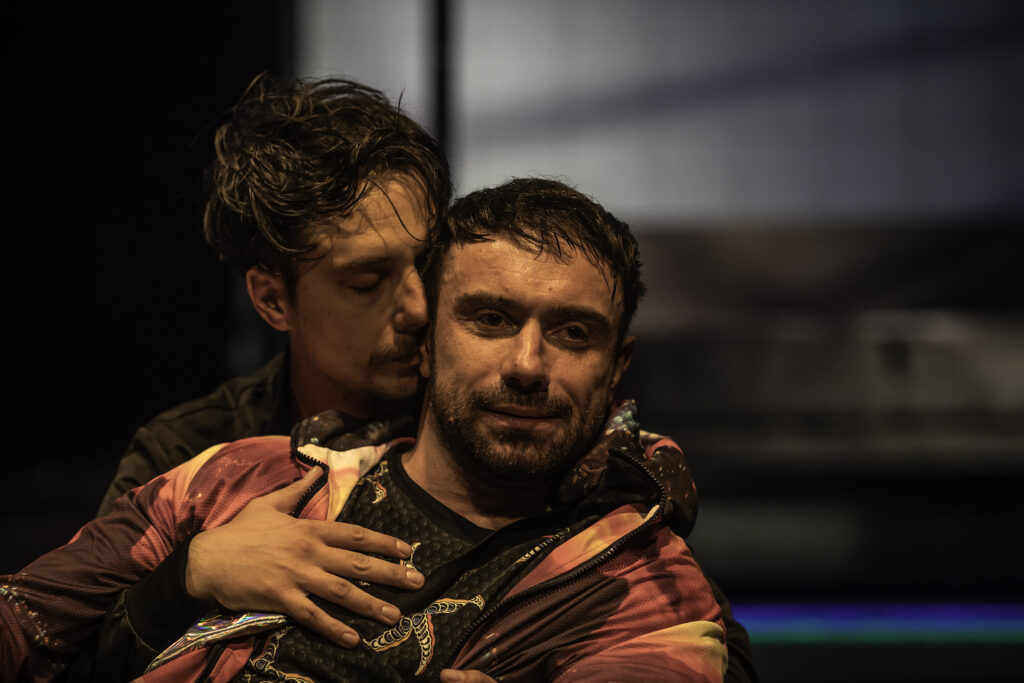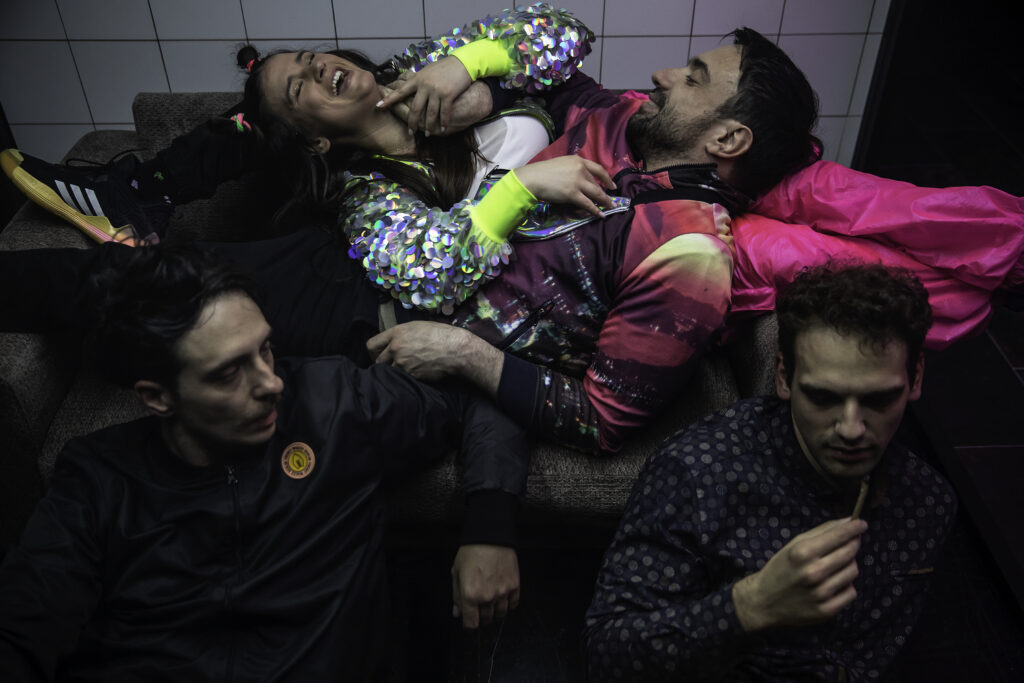Sarajevo War Theatre (SARTR), premiere 24th April 2024
God is a DJ, and his name is Kosta. He is enthroned high above us, on an altar of metal and neon lights, tuning the techno beats on his mixing console. Just before he raises his voice to preach to the crowd, a staggering flash of light strikes the disco ball above his head, leaving behind a nimbus-like crown to honour his holiness. Then, with a tone vast and alluring, he whispers into the mic: “I look at those lost and sweaty faces. And I see people who are finding themselves in the hope of receiving some kind of catharsis. And I like to believe that it is I who brings it to them. That tonight, I am your God.” And so it begins.
Directed by Ajla Bešić, Armin Behrem’s Podroom is visually as spectacular as its opening scene. And more than that, it is a manifestation of intimacy, authenticity and artistic unity. In fact, everyone involved in the creative team behind this performance are renowned artists from Sarajevo’s local scene including Adisa Vatreš Selimović on scenography, Lejla Hodžić for costume design, Amila Terzimehić for choreography and Kemal Beganović on visuals, orchestrated by the visual artist Bojan Stojčić. The music is composed by the musical producer and DJ Mirza Rahmanović, better known as INDIGO.

Podroom, SARTR. Photo: Damir Šagolj
Every visual and acoustic element feels like a character in its own right – so vivid and powerful that it can feel overwhelming at times. Nevertheless, altogether they create an atmospheric space that immerses the audience completely, drawing them into the emotional and sensory world of the play and its struggling, partying characters.
Bešić’s directorial style rests on conceptual scenography and complex light design which, by focusing on the personal stories of young individuals, illuminates a necessity that remains rare in Sarajevo. While this approach might appear obvious – or even banal – to an international audience, it is crucial locally, where the theatrical scene still gravitates toward war and family tropes, often presented in an outdated realism tied to the Stanislavski school. Within such a context, young voices are still scarce, and younger generations of theatergoers struggle to identify with the stories and characters they see on stage. This is precisely where Bešić and the writer/dramaturg Behrem intervene. Their interest lies in the loners, the misfits, the outsiders – in short, those misunderstood by the majority.
This play is one of many collaborations between Bešić and Behrem. Both are alumni of the Academy of Performing Arts Sarajevo, where their artistic bond was forged. Set in the nightlife of Sarajevo, the story unfolds between apartments and techno clubs, where intimate and public spaces intertwine, and the music is so buzzingly loud that one can barely hear their own thoughts, let alone the words spoken by the person next to them. This is where Behrem’s monologue-structure becomes strikingly effective. On stage, the characters mostly talk to themselves, sharing their fears and inner desires as if addressing a mirror in some quiet, dark place. More than that, it feels as though they are speaking through a wave of nostalgia, looking back on the events of the single night that the play depicts. Ishak, the main character, has the power to disrupt the storyline in order to set it right, revealing how things really happened – bringing the play to a metalevel that harmonizes perfectly with the metaphysical resonance of the music.
The characters in this play strip themselves bare. Refreshingly, not in the literal sense of taking off their clothes, but emotionally – down to the hidden place where the “duša” (soul) resides. There is Ishak (Faruk Hajdarević), who is in love with Kosta (Dino Sarija), and Marija (Anastasija Dunjić), who is in love with Baja (Edin Koja Avdagić). All of them are in relationships – some with each other, others with different partners. What initially seems like the plot of a simplistic love story reveals itself as the devastating reality of many among us. The impossibility of love as the highest level of intimacy has many reasons: economic and social, personal and public, clever and foolish, imagined and real. In Podroom it is a complex web that prevents the four individuals from being happy together with some of the main issues being homophobia, toxic gender roles, and unrealistic expectations of love. What results is violence as a response to these constraints, one that reflects not only individual cruelty but also the structural forces shaping them.

Podroom, SARTR. Photo: Damir Šagolj
All four actors play their roles with captivating vigour, carrying the audience seamlessly through the 90 minute performance. Hajdarević delivers a character whose clumsiness and shyness evoke such endearing vulnerability that one roots for him immediately, as demonstrated in his final monologue, which moves the audience to tears. Sarija plays it cool, allowing his character only fleeting moments of fragility, and his subtle intensity heightens the heartfelt poignancy of Kosta and Ishak’s love story. Dunjić electrifies with her mesmerizing presence, commanding attention even in silence and a tenderness that lingers after the scene ends. Avdagić is uncompromising, embodying his character with raw honesty that never shies from discomfort. His outbursts of violence are not gratuitous, but expose how deeply the character is marked by the very constraints the play seeks to question
Not only is Podroom a sensual feast, it’s a clear declaration to Sarajevo’s young artistic scene. By unifying renowned individuals from different departments, Bešić proves herself to be a visionary leader that before anything else values the importance of collective endeavour. In combination with Behrem’s strikingly outgoing writing style and an ensemble that successfully balances vulnerability with intensity, this performance is proof that Sarajevo’s stage can be both uncompromisingly local and unmistakably contemporary.
Credits:
Author: Armin Behre//Director: Ajla Bešić//Composer Mirza Rahmanović – Indigo//Scenography: Adisa Vatreš Selimović//Costumes: Lejla Hodžić, koreografkinja Amila Terzimehić//Video: Bojan Stojčić //Visual designer: Kemal Beganović
Cast: Faruk Hajdarević, Anastasija Dunjić, Dino Sarija, EdinKoja Avdagić
For further information, visit: sartr.ba
Berina Musa is a writer, dramaturg, and critic based in Sarajevo and Freiburg. She studied German linguistics, literary studies, and art history at the University of Freiburg and is currently completing a second degree in dramaturgy at the Academy of Performing Arts in Sarajevo. Her plays and short films have been presented at the Bosnian National Theatre Zenica, MESS, the Sarajevo Film Festival, and the Mostra Internazionale del Nuovo Cinema di Pesaro.








